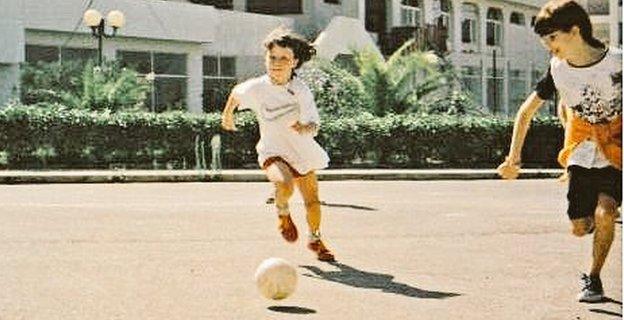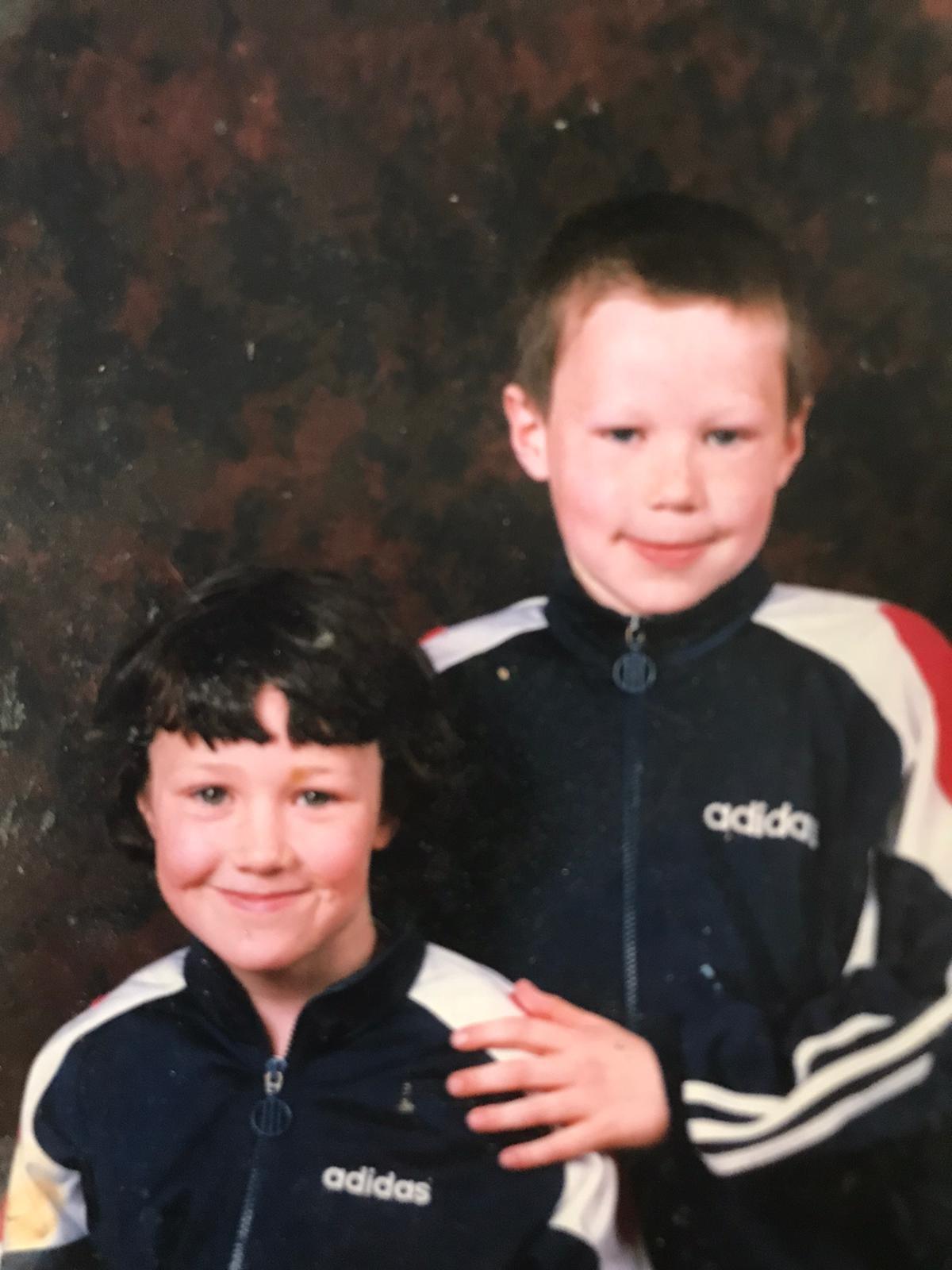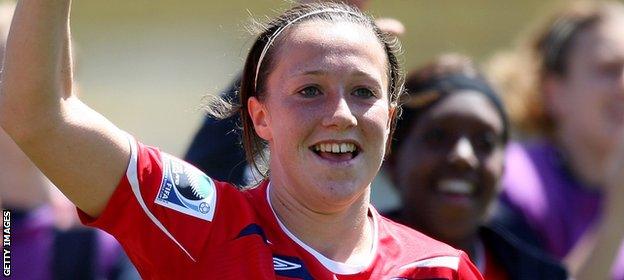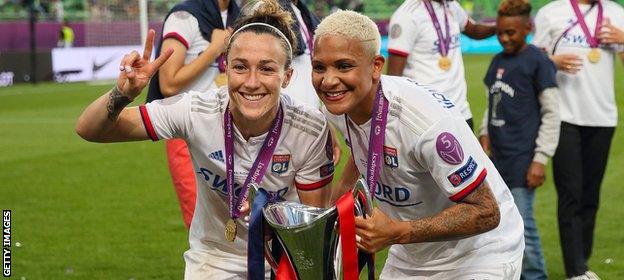Lucy Bronze: England & Man City defender describes her uneven path to stardom
- Published
Lucy Bronze wins BBC Women's Footballer of the Year 2020
Lucy Bronze has come a long way from cutting pizzas.
The England defender, who has rejoined Manchester City, has experienced a career of ups and downs on her way to winning 81 caps for her country and numerous trophies with Liverpool, City and Lyon.
Bronze added the 2020 BBC Women's Footballer of the Year to her honours list in March, claiming the BBC World Service award for the second time in three years.
After winning the award, at the age of 28, she reflected on almost three decades of finding her way in football, from sibling rivalry to World Cup semi-finals.
Eight years old: 'I wanted to beat my brother'
Born in Berwick-upon-Tweed, Northumberland, Bronze grew up with her younger sister, Sophie, and older brother, Jorge. She joined the Sunderland academy at under-12 level.

"I've just realised now in my late 20s that being a competitive, strong little girl was the best thing that could have happened to me" - here Bronze plays football with her brother Jorge in Portugal
"When I was with my brother it was about being like him. I wanted to beat my brother and do what he does.
"I loved every sport anyway - I did every sport - but football was the sport my brother loved and I fell in love with it through that.
"I got a bit of acceptance through football - I was a very shy child but football was the way I made friends throughout my childhood.
"I've been in that time when I had to pay for the field and to pay to turn up and train twice a week. It's one of the things I'm so proud of in my career: going from that to living in a different country and winning Champions Leagues. It's from one end of the spectrum to the other and not many are going to have that experience.
"I'd say to my younger self: 'Enjoy what you do and make sure you work hard.' Everything I have now is through hard work. I have some talent, but my hard work outweighs my talent in my career.
"To grow alongside women's football and to see where it is now, I'd have never dreamt it when I was 11 or 12 years old, when I first got into playing in girls' teams.
"As a girl I think I've been told it's not normal; it's not a girly thing to be competitive and strong.
"It's something I've fought against my whole life. I've just realised now in my late 20s that being a competitive, strong little girl was the best thing that could have happened to me."

"Football was the sport my brother loved and I fell in love with it through that" - Bronze pictured with her brother Jorge
Eighteen years old: 'I was working in Domino's'
At the age of 17, Bronze moved to the United States to join the University of North Carolina on a scholarship, but moved back to England a year later to study at Leeds Beckett and play for Everton, before joining Liverpool. It proved to be a frustrating time in her career, having to have three knee operations in the space of two years.

Bronze at the 2008 Under-17s World Cup, where England finished fourth
"Eighteen to 19 and 20 was probably the hardest part of my career, the hardest part of my life.
"I had moved away from home, moved to America and come back. I got injured and was working at Domino's, studying at university full-time, while trying to fit in training.
"I lived in Leeds but was travelling to Liverpool to train for Everton at the time and my life was constantly on a loop of get up early, go to the gym, go to uni, go to work, go to football, come back and do it again.
"Now I'm just tired going to training without a full day of studying, dissertations, cutting up pizzas, and doing the training as well - it was crazy. And to be injured at times was the hard part because you didn't get paid to play football, and the girls who did get paid, it was only when you were fully fit.
"I didn't ever feel sorry for myself. I had the hardest time but I always knew everything was going to be OK. I'd say that to me at 18 - the hard work is going to count for something."
Twenty-eight years old: 'I'd love to captain England'
Bronze made her England debut in 2013, and after winning the Women's Super League twice with Liverpool, she moved to Manchester City, where she won the league again before switching to Lyon in 2017 and going on to win the Champions League and French league twice. She captained England at the 2018 SheBelieves Cup and has reached two World Cup semi-finals.

Bronze won the Champions League (pictured here with the trophy and team-mate Shanice van de Sanden), French league and French cup with Lyon in 2019
"When you talk about moments in your career, leaving England to join Lyon was one of the biggest. I had just bought a house in Manchester, and it could have been quite easy for me to stay there and play there.
"But I had this opportunity to play with kind of like the Galacticos in women's football. There was never a plan where I said 'no' to Lyon.
"In English football there is a lot of onus on the captain. My whole career I said it's something I didn't want - it's not that I didn't want it, I just didn't feel like it was going to change me. But as I've got older I've realised there's so much you can influence by being the captain or a leader in the team.
"Now I'd love to be the captain of England. I want to win things with England and have an influence with the team, and I think it's a great way to do it.
"Now, to be be playing at Wembley with England, for millions of people to be watching the Women's World Cup, it's exciting and the quality of football is only going to improve.
"It's part of the reason I don't want my career to end. I want to carry on now with the buzz around women's football."
A version of this article was originally published on 25 March 2020.